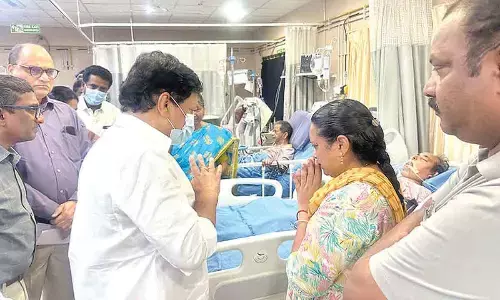Need to strengthen primary education
Need to strengthen primary education, Chukka Ramaiah, examination fever. We are now in the 21st century where globalisation and modernisation are posing demanding challenges to individuals and society alike.
Come February and I see a special fever spreading all around-the examination fever-both in the students and their parents, and strangely enough it crosses all barriers and does not leave even the parents of primary school goers! Everyone wants a very high percentage and does not bother about the standard or the absence of it in the questions and evaluation procedures. This makes me wonder if we are rushing on a wrong track right from the start, if we are not continuing to mass produce dispensable, expendables instead of knowledge work force which needs a professional approach from the start.
We are now in the 21st century where globalisation and modernisation are posing demanding challenges to individuals and society alike. Increasingly diverse and interconnected populations, rapid technological changes in workplace and in everyday life and instantaneous availability of vast amounts of information are a few of the factors contributing to the new demands. While we compete for jobs globally, we must be conscious that our knowledge skills must be on globally competitive scale. Rapid job automation is shrinking the need for conventional type of routine jobs. There is the need only for high-wage knowledge workers with specialised skills, creativity and innovation. To meet this need, we need to strengthen our education structure right from its primary level, and not just at the terminal level and I find the reforms adopted by Finland in this regard to be worth emulation though ours is a very big nation and may face many obstacles on the way. Their reforms in enhancing teacher competence, curricular reforms along with decentralisation of power and common schooling for nine years and professionalisation of education have yielded meritorious rewards for the nation’s economic progress.
The example of Finland
In Finland, prior to 1970s, teachers who passed plus two were trained in pedagogy, child development, classroom management and were appointed in primary schools. Since the 1980s, they have enhanced the teachers’ competence by making an MA mandatory. They are offered training in education along with one subject from the concerned department at the university itself. For a primary school teacher the major subject is education and the minor subject option could be any of the subjects taught in primary schools. For a secondary school teacher, a bachelor’s degree in two majors is a must, followed by three years of pedagogy learning at the university. It highlights the importance given to subject competence in enhancing quality in teaching. Teacher preparation includes extensive courses on how to teach, a strong emphasis on using research-based work and two years of clinical experience in a school associated with a university. One of their major decisions to enhance quality has been to entrust the process of selection, course designing and all other factors to universities!
Do we depend on an untrained nurse for health care? So, too, we cannot depend on an untrained teacher to impart primary knowledge. So, this is also a sacred profession requiring three years of training in which the teacher has to work for two years in a school attached to the university and gain practical experience which is more valuable than any amount of mere reading or theorising. The selection procedure is very rigid and does not leave out a scrutiny of the candidate’s school records and participation in cultural activities at that level too, supported by their HM’s letter of recommendation. Universities themselves conduct the primary screening, conduct tests, interviews including on teaching skills and then inquire on the candidates’ character.
Initially Teacher associations opposed such rigid selection procedure but when they realised that the government has enhanced their salaries to an enviable level and bestowed a professional status to teachers, the associations acceded. The change in attitude is so great that now it is a highly opted and competitive profession where 9,000 or more candidates apply for just 600 posts.
Even after the appointment, stress is on continuous improvement of quality through research. Every primary teacher must submit annually, at least one research paper on school education while high school teachers must submit a research paper on the subject they teach. The rationale for requiring a research-based dissertation is that teachers are expected to engage in disciplined enquiry in the class room throughout the teaching career. Questioning skills, teaching skills, motivational skills are taught in the pedagogical skills.
Nine years of comprehensive schooling is yet another major reform. In this common school system equity is the goal. The schools are no longer controlled by government but by local bodies to strengthen the system through continuous interaction and support keeping the local needs and problems as well as resources in mind.
Another plus point to be noted is regarding the curriculum in this common schools aiming at comprehensive education! The core curriculum is the same, it is not more than 10 pages and it gives ample scope for teachers to plan how to go ahead depending on their learners’ level. Unlike in our schools so far, external examinations are not the deciding factors in assessment. True assessment is by the teachers themselves in the classrooms. The common test conducted at the end of the primary education is only to see how far the learners have progressed. So, there is very less dropout rate and a very strong foundation is laid for the secondary education. As teachers are trying to improve their children’s welfare, teachers are respected by society, as the schools are full service schools, they offer more than education, free food, health care, dental services, guidance, counselling, access to broader areas of mental health and other services.
One feature which touched me above all, is the provision for a special teacher for every class. His work is solely to identify and support weak students. Review meetings take place every fortnight and for them, the principal, special education teacher, school nurse, school psychologist, a social worker, the teacher whose students are being discussed, parents are contacted so as to observe and contribute. With the vision of success for all, they identify the special category or academically weak students who are around 8 per cent and do their best. How nice it would be for us to have such a system in our primary schools! I saw a ray of hope when I met some students from REC Warangal sparing a few hours a week to help the weaker students in the nearby government schools. I only wish that such good deeds inspire other students also to adopt these
Education, economic growth and the nation’s ability to spin wealth are interlinked. Just as Finland has identified the root cause of their poor education standards and adopted stringent measures to rectify them, let us also strive against all odds to bring quality to our primary education by enhancing our teachers’ competence. Competing in the global market and providing knowledge workers will be possible only this way.










